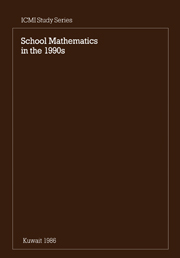Book contents
- Frontmatter
- Contents
- Foreword
- Acknowledgements
- 1 Mathematics in a Technological Society
- 2 Mathematics and General Educational Goals
- 3 The Place and Aims of Mathematics in Schools
- 4 The Content of the School Mathematics Curriculum
- 5 On Particular Content Issues
- 6 Classrooms and Teachers in the 1990s
- 7 Research
- 8 The Processes of Change
- 9 The Way Ahead
- Bibliography
7 - Research
Published online by Cambridge University Press: 26 April 2011
- Frontmatter
- Contents
- Foreword
- Acknowledgements
- 1 Mathematics in a Technological Society
- 2 Mathematics and General Educational Goals
- 3 The Place and Aims of Mathematics in Schools
- 4 The Content of the School Mathematics Curriculum
- 5 On Particular Content Issues
- 6 Classrooms and Teachers in the 1990s
- 7 Research
- 8 The Processes of Change
- 9 The Way Ahead
- Bibliography
Summary
The Status of Research
There has been a considerable increase in the amount of research carried out in mathematics education in recent years. This is evidenced in the number of research degrees awarded, of centres established, of journals published and of national and international meetings held.
In many countries, however, the peak for spending on educational research has now passed; in the developing countries little money has ever been expended on research activities, and even in those countries thought of as ‘big spenders’ the actual percentage of the educational budget allotted to research and development has always been miniscule. Thus, for example, in the USA investment on research and development accounted in 1983 for less than one-tenth of one per cent of the total expenditure on education: comparable figures for defence, health and industry were 15, 2 and 2.6 per cent respectively (N.R.C., 1985, p.43).
Why is educational research and development so poorly-rated? Why, when educational systems devour so great a proportion of national budgets, is so little money spent in studying their working and in developing ways to improve them? The proportion of children whose lives are blighted by their ‘education’ must be considerably higher than the proportion of adults who die from some of the medical conditions which will always attract research money.
- Type
- Chapter
- Information
- School Mathematics in the 1990s , pp. 83 - 90Publisher: Cambridge University PressPrint publication year: 1987



